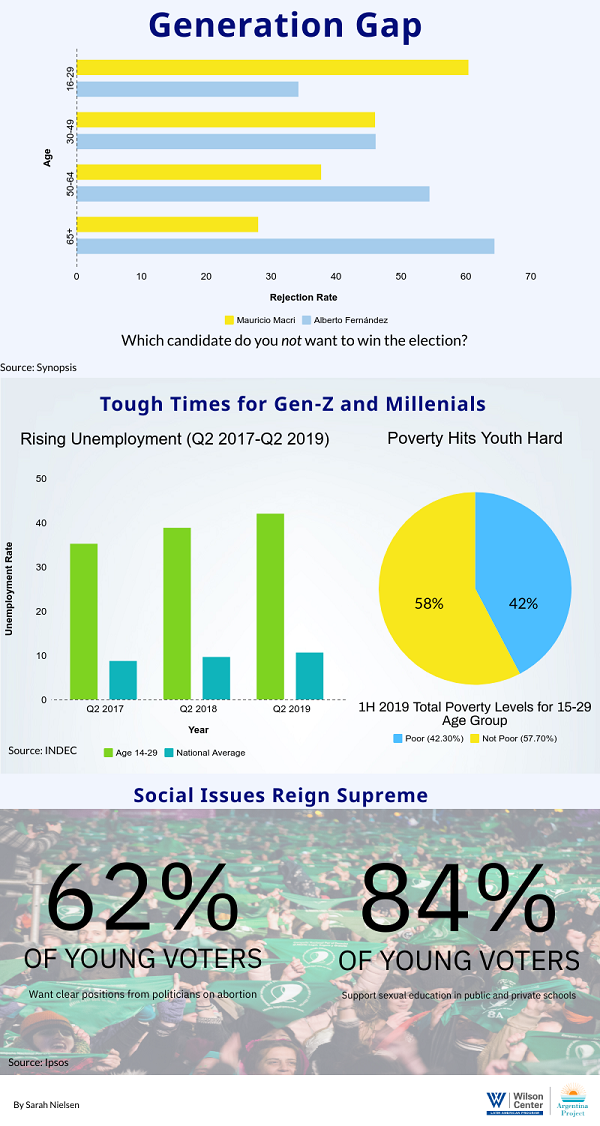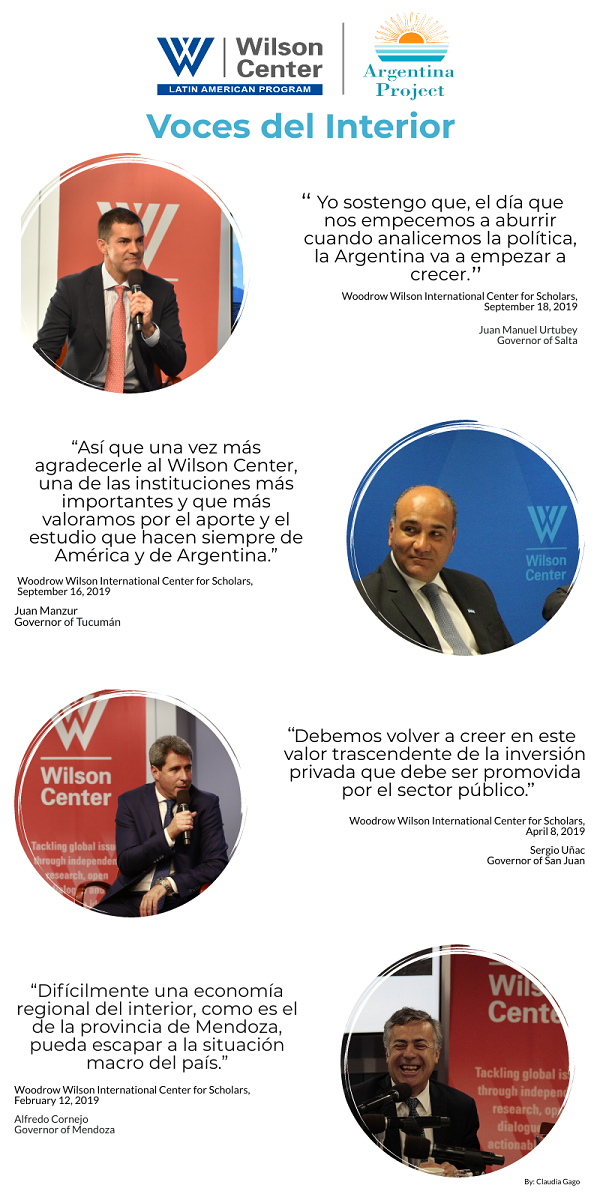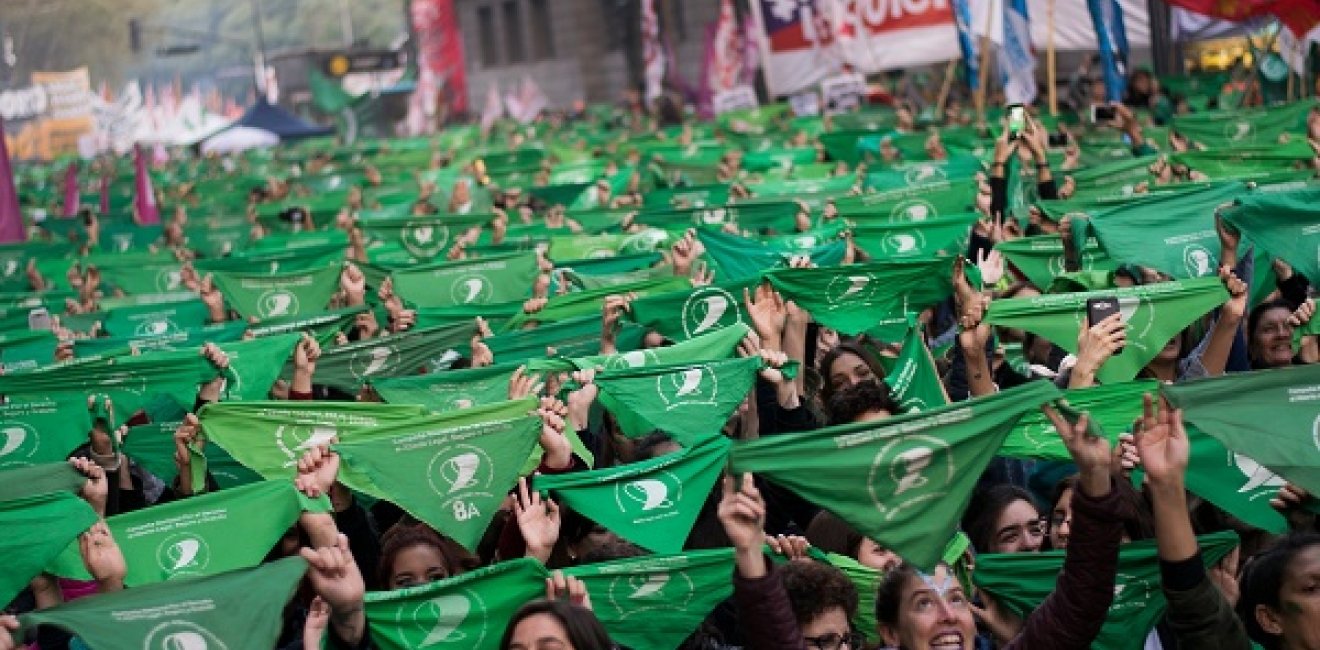
A blog of the Latin America Program
Youth in Revolt
To shore up his socially conservative base after a pummeling in August’s primaries, Argentine President Mauricio Macri left behind his understated anti-abortion stance and declared he is “clearly in favor of both lives,” alluding to the slogan favored by social conservatives.
This makes sense, insofar as Mr. Macri’s base is generally older and more socially conservative than supporters of his Peronist opponent. At the same time, his stance risks alienating young voters who hold progressive views on issues such as abortion, gender equality and LGBTQ+ rights.
A recent Ipsos report found that gender equality, respect for sexual diversity, social justice and environmental protection are top issues for Argentine voters aged 18 to 24. For example, 62 percent indicated it was “very important” for political candidates to have a clear position on abortion, and 84 percent supported sex education in public and private schools. Gen-Zers (born between 1995 and 2015) are three times more likely than members of any other age group to believe Argentina’s next president should protect the environment.
Recently, these topics have gained nationwide attention. Last year, Argentina’s lower house approved the legalization of abortion, but the bill was narrowly defeated in the senate. In the same year, legislators pushed to improve upon a 2006 law on sex education in schools which since its inception it has not been uniformly implemented.
Though these issues have not factored prominently in this year’s presidential campaign, young voters have clearly gravitated toward the opposition. A June Synopsis poll asked, “which candidate would you not like to see win the election?”, and the results showed a stark generation gap: voters over 65 rejected the opposition Peronists by 64 percent, while Mr. Macri received a similar brush-off – 60 percent – from voters aged 16 to 29.

The Peronist candidate Alberto Fernández’s success appealing to young voters builds on Peronism’s strides with this demographic in recent years. Under former President Cristina Fernández de Kirchner (2007 to 2015), Argentina adopted notably progressive social policies, such as the legalization of same-sex marriage in 2010, and the Gender Identification Law in 2012.
In addition to riding on the coattails of Ms. Fernández de Kirchner, Alberto Fernández has an appealing personal story of his own for young, progressive voters, as his son is a well-known member of the LGBTQ+ community. His platform helps too; for example, after fits and starts, he confirmed during a presidential debate that, if elected president, he would decriminalize abortion.
At the same time, beyond his anti-abortion stance, Mr. Macri has been turning off young voters, who have been disproportionately affected by Argentina’s flailing economy. In the second quarter of this year, unemployment for males aged 14 to 29 reached 19 percent, and 23 percent for females in the same age group, compared to a national unemployment rate of 11 percent.
For many first-time voters – Argentines can vote at 16 – this is their first economic crisis. Compared to their parents, who have lived through countless economic dramas (and internalized an “Argentina no sale más” cynicism), many Argentine youth only recall better days under the populist Fernández de Kirchner, helping to build nostalgia for Peronism. Even some conservative young people are rejecting Mr. Macri, as seen in the surprising rise of Frente Despertar candidate José Luis Espert.
As a result, and to fuel additional support, the Peronist coalition Frente de Todos has attracted young politicians, including Ofelia Fernández (no relation to either member of the presidential ticket), a 19-year-old attempting to become the youngest legislator ever in the City of Buenos Aires. An admirer of U.S. Representative Alexandria Ocasio-Cortez, Ms. Fernández has set out to emphasize social issues in the City of Buenos Aires.
“I think better times are coming,” Ms. Fernández said.
For now, young Argentines, like Ms. Fernández, are not in the streets like their protesting counterparts in neighboring Chile. But should governments continue to disappoint the country’s youth, it’s easy to imagine a similar outburst across the Andes.
Eyes on the Prize
As Argentines head to the polls this Sunday for the presidential election, the Argentina Project wants to thank you for your support for our candidates and kingmakers series at the Wilson Center.
Sergio Massa spoke at the Wilson Center in October 2018 when he was considering a presidential run. A year later, in October 2019, he returned to the Wilson Center, this time as a legislative candidate for Buenos Aires Province, a key backer of Alberto Fernández, and will likely be the new speaker of the Chamber of Deputies.
Libertarian presidential candidate José Luis Espert joined us at the Wilson Center in February 2019, after announcing his candidacy to advocate radical conservative policies as an alternative to center-right President Mauricio Macri.
Axel Kicillof, Argentina’s former finance minister under Cristina Fernández de Kirchner, discussed the potential policy responses to Argentina’s financial crisis and economic stagnation. Shortly after his stop at the Wilson Center, he announced his candidacy for governor of Buenos Aires Province, representing Mr. Fernández’s Frente de Todos coalition.
Finally in September 2019, we hosted Salta Governor Juan Manuel Urtubey the vice presidential candidate for the Alternativa Federal coalition alongside Roberto Lavagna, the former finance minister under Néstor Kirchner.


Latin America Program
The Wilson Center’s prestigious Latin America Program provides non-partisan expertise to a broad community of decision makers in the United States and Latin America on critical policy issues facing the Hemisphere. The Program provides insightful and actionable research for policymakers, private sector leaders, journalists, and public intellectuals in the United States and Latin America. To bridge the gap between scholarship and policy action, it fosters new inquiry, sponsors high-level public and private meetings among multiple stakeholders, and explores policy options to improve outcomes for citizens throughout the Americas. Drawing on the Wilson Center’s strength as the nation’s key non-partisan policy forum, the Program serves as a trusted source of analysis and a vital point of contact between the worlds of scholarship and action. Read more


Argentina Project
The Argentina Project is the premier institution for policy-relevant research on politics and economics in Argentina. Read more

Explore More in Weekly Asado
Browse Weekly Asado
Dengue Haunts South America’s Summers

Lessons from Costa Rica’s Economic Transformation

Women and Latin America’s Digital Revolution

